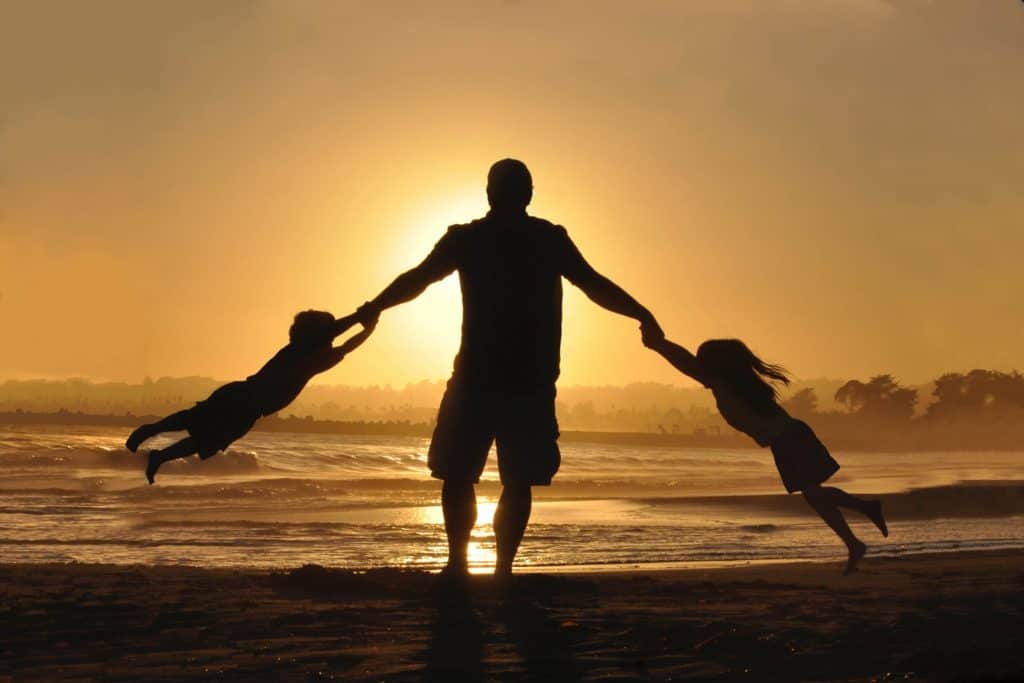
What Are the Biblical Roles of Husband and Wife?
What are the roles of Christian men and women in marriage? And why does it matter? Here are a few things to consider.

Moms: Stop, pause and observe to see how a father’s unique contributions to parenting will benefit his children.
Estimated reading time: 5 minutes
It’s pretty obvious that dads parent differently than moms. My daughters are in their 30s and I recognize traits in each of them that they learned from their father. Thankfully, I didn’t interfere with the learning process but came very close to squelching it and neglecting my children of the benefits of their father’s unique contributions to parenting.
Admit it moms. You’ve been ready to step in and rescue your children from being thrown too high in the air or coaxed to jump from a tree limb that looks high enough to result in broken bones. Or how about verbal coaching that sounds more like a drill sergeant than an encouraging parent? When my children were really young, I armed myself with my parenting knowledge and rehearsed the most gentle way that I could tell my husband he was doing everything wrong.
ad:
But once, when I was unsuccessful in my efforts to encourage my daughter to get into the swimming pool, my husband suggested that he gently push her in. This sounded too harsh to me. However, I stopped, paused, and trusted that my husband would know what to do at the right time. After all, he had been with her since she was born and she trusted him completely. This was the first time I had considered a father’s unique contributions to parenting.
Therefore, I simply waited and observed. My daughter stood trembling, thinking she was standing on the edge of a watery abyss. In a classic demonstration of how dads parent differently than moms, her father came up behind her, put his arm around her shoulders and jumped in with her. Once she confirmed that she wasn’t going to get swallowed up by the deep, she stayed in the water for hours, went on to join the swim team in our neighborhood and has become a lifelong lover of a variety of water sports.
The important thing to remember here is the time that my husband had invested in bonding and attaching with his children. He was intent on being the best dad he could be. They could take more risks with him because he had spent so much time cultivating a warm, loving and supportive relationship with them.
Both of them intuitively sensed that their father was not going to do anything that would hurt them or put them in danger. And I learned something else from my husband that day. When my daughter emerged from the unexpected dunking, she had a shocked and surprised look on her face. I might have responded to that with sympathy which could have encouraged tears. Instead, my husband laughed and gave her a “high five” to which she responded, “That was fun Dad! Do it again!”
Fast forward about twenty years and my other daughter was in nursing school, struggling through organic chemistry and microbiology. We began to get weekly phone calls that described the rabbit trails in her brain that had her flunking courses, having to spend six years getting her nursing degree and being stuck in a place she didn’t like. Honestly, I could feel her pain as someone who had found those same courses challenging while in college. I offered my belief that she would pass (which she did) while I empathized with and acknowledged her fears. Remember, dads parent differently than moms and that was certainly the case here. From my perspective, it seemed as if my husband discounted her feelings and I thought he was being insensitive. He proceeded with practical suggestions for moving forward. My daughter later acknowledged that both responses were very helpful.
She was really just acknowledging what the Bible tells us about Jesus. John 1:14 (ESV) says:
“And the Word became flesh and dwelt among us, and we have seen his glory, glory as of the only Son from the Father, full of grace and truth.”
Over and over we see examples of how Jesus dealt with people. He always led with grace and followed with truth. Since that day, I have tried to remember to be Christ-like when I respond to people, especially hurting people. I confess that I sometimes don’t succeed, in which case someone else has to show me grace and truth!
While all moms and dads are different, there is plenty of evidence to show that moms tend to bring more sensitivity and emotion to parenting than dads and fathers tend to encourage more problem solving and risk taking than moms. Recognize that both are essential to the healthy growth and development of your children. Too much of any one good thing can create problems. Being tuned into a child’s emotional life is important but it can be stifling if there is too much effort to protect the child from every bump and bruise that life has to offer. On the other hand, while learning to take appropriate and necessary risks is important, taking risks that are potentially dangerous may lead to unintended accidents or set children up for needing to feel the rush of a risk accomplished, on a consistent basis.
Kiss your babies, snuggle with your toddlers, empathize with your elementary, middle school and high school kids. Continue to provide them with the physical, emotional and spiritual support they so desperately need. Let their father parent as only he can and appreciate a father’s unique contributions to parenting. Your children will benefit from both parenting styles and your kids will thank both of you when they become parents.